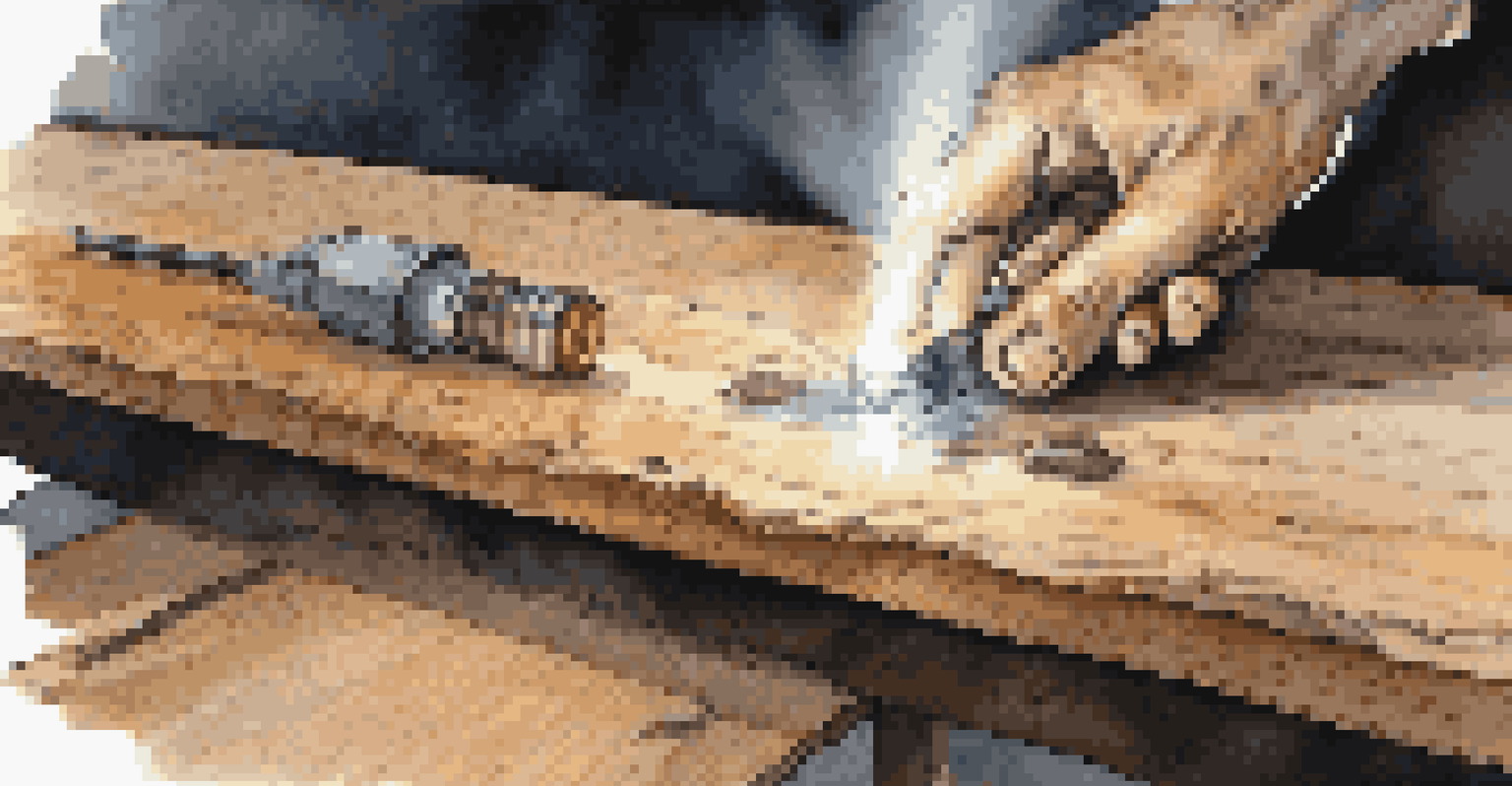Home Inspections: Building a Safe Foundation for Renovations

Understanding the Importance of Home Inspections
Home inspections are a crucial step before diving into any renovation project. They provide a detailed overview of the property's condition, revealing underlying issues that might not be visible at first glance. Think of it as a health check-up for your home; just like you wouldn't undergo surgery without a thorough examination, you shouldn't start renovations without one.
A house is made of walls and beams. A home is built with love and dreams.
By identifying problems such as structural defects, plumbing issues, or electrical hazards early on, you can save yourself from costly surprises later. This proactive approach not only ensures safety but also helps you budget more accurately for your renovation project. After all, unforeseen repairs can quickly turn your dream renovation into a financial nightmare.
In short, a home inspection lays the groundwork for a successful renovation journey. It equips you with the knowledge needed to make informed decisions, ensuring that you invest your time and money wisely. So, before you pick up that hammer, consider scheduling a comprehensive inspection.
What Does a Home Inspection Cover?
A thorough home inspection typically covers various aspects of the property, including the roof, foundation, plumbing, HVAC systems, and electrical wiring. Inspectors look for signs of wear, damage, or any code violations that might pose safety risks. Imagine a detective uncovering clues; that’s exactly what a home inspector does to unveil the truth about your home’s condition.

They will also assess insulation and ventilation, as these factors significantly impact energy efficiency and overall comfort in your home. If your home is like a living organism, these systems are its vital organs—if they're not in good shape, the whole system can suffer. This comprehensive assessment provides you with a clear picture of what needs attention before renovations begin.
Home Inspections Prevent Costly Surprises
Conducting a home inspection before renovations helps identify underlying issues, allowing homeowners to budget accurately and avoid unexpected expenses.
Ultimately, knowing what areas require repair or improvement allows homeowners to prioritize their renovation plans. You can focus on critical issues first, ensuring your renovations enhance both safety and functionality. Without this insight, you risk pouring resources into cosmetic updates while ignoring potentially dangerous problems.
Choosing the Right Home Inspector
Selecting a qualified home inspector is crucial to ensuring a reliable evaluation of your property. Look for licensed professionals with solid experience and positive reviews—think of it as choosing a trusted mechanic for your car. You wouldn't want just anyone tinkering under the hood, right?
An ounce of prevention is worth a pound of cure.
Ask for recommendations from friends, family, or real estate agents who can vouch for the inspector's expertise. It's also wise to verify their credentials and check if they belong to a professional association, which often requires adherence to a code of ethics and ongoing education. This extra layer of assurance can make a significant difference in the quality of your inspection.
Remember, a good inspector should be willing to answer your questions and explain their findings clearly. This transparency will empower you with the knowledge you need to make informed decisions about your renovation project, ensuring you’re well-prepared for the journey ahead.
The Cost of Home Inspections: An Investment Worth Making
While home inspections come with a cost, they are often a wise investment in the long run. The average price for a home inspection can range from $300 to $500, depending on the size and location of the property. Consider this as a small price to pay for peace of mind—after all, avoiding major repairs later can save you thousands.
By uncovering hidden issues early, you can negotiate repairs with the seller or adjust your renovation budget accordingly. It’s like finding out a car has hidden damage before you buy it; you wouldn’t want to invest in something that’s not worth it. This foresight can help you allocate funds more effectively, ensuring your renovation stays on track and within budget.
Choose a Qualified Home Inspector
Selecting an experienced and licensed home inspector is essential for obtaining a reliable evaluation of your property.
Ultimately, investing in a home inspection is about safeguarding your financial future. With the right information, you can move forward with your renovations confidently, knowing you're making decisions based on facts rather than assumptions.
Common Issues Found During Home Inspections
During a home inspection, several common issues frequently come to light. These can include outdated electrical systems, water damage, roof leaks, and even pest infestations. Imagine stepping into a seemingly perfect home only to discover hidden flaws lurking beneath the surface—this is why inspections are essential.
Many older homes may have outdated plumbing or wiring that could pose safety hazards or lead to inefficient use of resources. For example, the presence of lead pipes or knob-and-tube wiring can be red flags that require immediate attention. Recognizing these issues upfront allows you to address them before they escalate into larger problems during your renovations.
Additionally, structural issues like cracks in the foundation or misaligned walls can compromise the safety of your home. Identifying these problems early means you can plan for necessary repairs, ensuring that your renovations are built on a solid foundation—literally and figuratively.
How to Prepare for a Home Inspection
Preparing for a home inspection can help ensure a smooth process and accurate results. Start by decluttering and cleaning the areas that will be inspected, such as the attic, basement, and crawl spaces. This not only makes it easier for the inspector to do their job but also shows that you take the process seriously.
Consider providing the inspector with any maintenance records or previous inspection reports you may have. This information can give them a clearer picture of the home’s history and any recurring issues. Think of it as providing a medical history to a doctor; it helps them understand the context and make more informed assessments.
Prepare for a Smooth Inspection Process
Decluttering and providing maintenance records can facilitate a thorough home inspection, ensuring accurate results and insights for your renovation.
Lastly, be available during the inspection to answer any questions or provide access to specific areas. This openness fosters communication and allows you to gain valuable insights directly from the inspector. By being proactive, you can make the most of the home inspection experience and set the stage for a successful renovation.
Moving Forward After the Inspection
Once the home inspection is complete, it's time to digest the findings and plan your next steps. Review the inspector's report carefully, noting any urgent issues that need addressing before renovations begin. Understanding the severity of each problem will help you prioritize which repairs should be tackled first.
If significant issues arise, consider consulting specialists for further evaluations. For instance, if the inspection reveals potential foundation problems, an engineer can provide insights on repair options. This collaborative approach ensures that you make informed decisions based on expert advice, setting you up for success in your renovation journey.

Finally, use the information gathered from the inspection to adjust your renovation plans accordingly. Whether it means reallocating your budget or changing the timeline, being flexible will allow you to navigate the renovation process with confidence. By taking these steps, you're not just building a home—you're building a safe and inviting space for you and your loved ones.